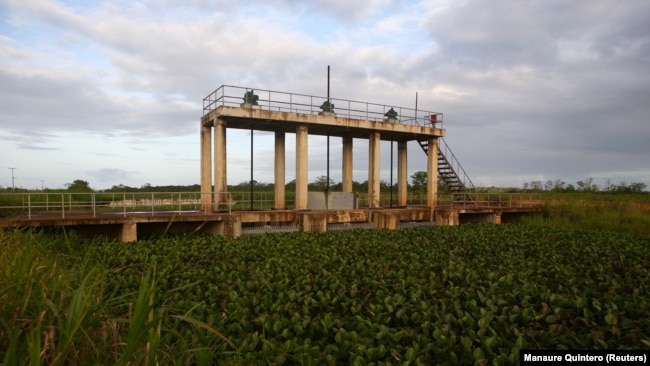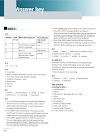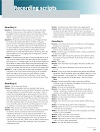
In Delta Amacuro, a Venezuelan state on the Caribbean Sea, a large Chinese construction company made an agreement with the country’s former president, Hugo Chavez. The state-run company would build new bridges and roads, a food laboratory, and the largest rice-processing plant in Latin America.
- construction /kən'strʌk∫n/ (n) sự xây dựng, tòa nhà
- laboratory /lə'bɒrətri/ (n) phòng thí nghiệm
The 2010 agreement says China CAMC Engineering Co, Ltd. would develop rice fields two times the size of Manhattan in New York City. The project would create jobs for the area's 110,000 residents.
- resident /'rezidənt/ (adj) thường trú, (n) cư dân
"Rice Power! Agricultural power!" Chavez wrote on Twitter at the time.
Nine years later, locals are hungry. There are few jobs and the plant is only half built. It runs at less than one percent of the predicted output. People who know about the development say it has not produced a single grain of locally grown rice.
- local /'ləʊkl/ (adj) địa phương, (n) người dân địa phương
- output /'aʊtpʊt/ (n) sản lượng, công suất, đầu ra, (v) cung cấp
- grain /grein/ (n) thóc lúa; lúa mì, hạt
Yet, CAMC and a few Venezuelan partners have made money.
Court case in Andorra reveals corruption
Project contracts and court documents from an investigation in Europe show that Venezuela paid CAMC at least $100 million for the development.
- court /kɔ:t/ (n) tòa án
- case /keis/ (n) trường hợp, vụ kiện cáo (v) đóng hòm, đóng két, bỏ vào hộp
- reveal /ri'vi:l/ (v) tiết lộ
- corruption /kə'rʌp∫n/ (n) sự thối nát, sự mua chuộc, hủ hóa
- contract /'kɒntrækt/ (n) hợp đồng
Reporters with the Reuters news agency examined thousands of pages of court papers on the CAMC case. The papers were filed in Andorra, a small country in the mountains between France and Spain. Lawyers there claim Venezuelans involved in the project tried to hide the money they received from CAMC for helping it get the contract.
- involve /in'vɒlv/ (v) đòi hỏi, bao gồm, lôi kéo
- project /'prədʒekt/ (n) dự án
Andorra is known for its large financial industry. Because of widespread corruption, the Andorran government decided to clean up its banking practices. In 2015, it took over the private bank, Banca Privada D'Andorra. That is the bank that handled money from Venezuelan officials and their families and friends.
- handle /'hændl/ (v) cầm bằng tay, điều khiển, xử lý, vận hành, đối xử, mua bán, buôn
The Reuters report is the first time the public is able to learn about Venezuela’s deal with China.
Last September, an Andorran high court judge charged that CAMC paid over $100 million in bribes to several Venezuelan officials to make sure the Chinese company would get contracts for five agricultural projects.
- charge /t∫ɑ:dʒ/ (n) lời buộc tội, (v) buộc tội ai
The result, according to prosecutors, was a far-reaching culture of bribery. The money was paid through foreign bank accounts to well-connected Venezuelans.
- prosecutor /'prɒsikju:tə[r]/ (n) người truy tố (trước tòa)
- bribery /'braibəri/ (n) sự hối lộ
Such payments illegally took money away from projects that were supposed to develop poor, forgotten parts of Venezuela.
The Andorran court charged 12 Venezuelans with crimes including hiding the source of money they got from the Chinese.
Neither CAMC nor any of its leaders were charged in the indictment.
- indictment /in'daitmənt/ (n) bản cáo trạng, sự buộc tội
- neither /'naiðə[r]/ Không cái nào, cũng không - neither… nor : không… mà cũng không
Abandoned projects
Since 2007, China invested over $50 billion in Venezuela, mostly in the form of oil-for-loan agreements, government documents show.
In a 2017 speech, Venezuelan President Nicolas Maduro said Chinese companies had agreed to 790 projects in areas ranging from oil to housing to telecommunications. Of those, he said, 495 were complete.
Some developments have been slowed because of corruption, people familiar with the projects said. Others got delayed because of poor management and a lack of supervision.
In Delta Amacuro, even government officials say a mixture of graft and poor management ruined the rice project. "The government abandoned it," said Victor Meza. He is with Venezuela's rural development agency, which worked with CAMC. "Everything was lost. Everything was stolen."
During a recent visit by Reuters to Delta Amacuro, the CAMC rice plant remained unfinished. Only one storage area, half full, held grain. Some machinery was running, but it was processing rice imported from Brazil. The nearby paddies hold no rice plants. The laboratory is incomplete. And the roads and bridges are not yet built.
We don't produce anything
Delta Amacuro's capital city, Tucupita, is a town of 86,000 people. In the past, Tucupita was a stop for vessels shipping goods from inland factories to buyers in the Caribbean and other places.
In 1965, the government dammed the nearby river. The land was damaged by sea water. By the time Chavez became president in 1999, little farming remained.
"When I was a kid, there was rice everywhere," said Rogelio Rodriguez, a local agronomist. "Now we don't produce anything."
In 2009, Chavez and Xi Jinping, China's vice president at the time, expanded a joint fund that the two countries had created with the 2007 development agreement. Chavez promised to supply Beijing with oil "for the next 500 years." He then announced the plan to redevelop the area around Tucupita.
But progress was slow. Chinese workers spoke little Spanish and struggled with local crews, according to engineers who worked on the project.
Maduro became president in 2013, shortly after Chavez’s death. He has sought to make something of the unfinished project.
Hand-packing rice imported from Brazil
In February, Agriculture Minister Wilmar Castro opened the "Hugo Chavez" plant. He did so by cutting a ribbon in front of rice sacks with pictures of Venezuelan and Chinese flags. An individual who went to the ceremony said no one from CAMC attended.
Instead of machinery able to process 18 tons of rice each hour, workers are packing imported rice by hand. "There's not a gram of rice growing anywhere here," said Mariano Montilla, a 47-year-old local who lives off the few crops he can grow in the low-quality land nearby.
"It seemed like a revolutionary idea," Montilla said of Chavez’s promise. "Now we're starving."
I’m Jill Robbins.
Angus Berwick reported on this story for the Associated Press.
Jill Robbins adapted it for Learning English. Ashley Thompson was the editor.
_______________________________________________________________
Words in This Story
bribe – n. something valuable (such as money) that is given in order to get someone to do something
indictment – n. an official written statement charging a person with a crime
prosecutor – n. a lawyer who represents the side in a court case that accuses a person of a crime and who tries to prove that the person is guilty
graft – n. dishonest activity in which people with power (such as political leaders) use their position and influence to get money and advantages
abandon – v. to leave and never return to (someone who needs protection or help)
paddy – n. a wet field where rice is grown
agronomy - n. a science that deals with the methods used by farmers to raise crops and care for the soil
ribbon - n. a narrow piece of cloth (such as silk) that is used to tie things or for decoration
sack - n. a bag that is made of strong paper, cloth, or plastic
Is there any Chinese development taking place in your country? What do you think of it? We want to hear from you. Write to us in the Comments Section.








